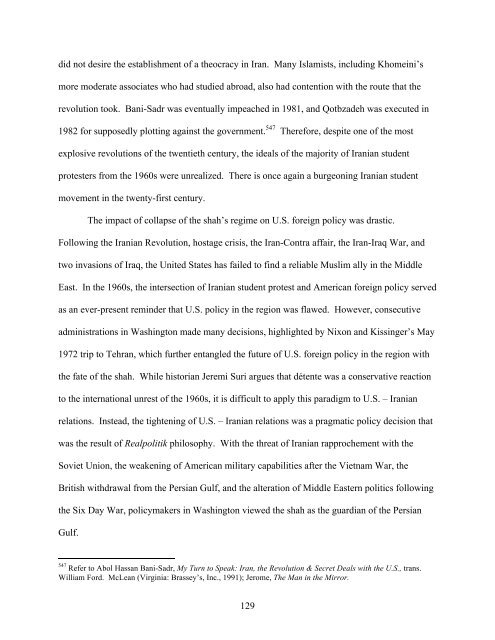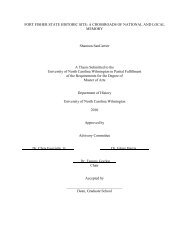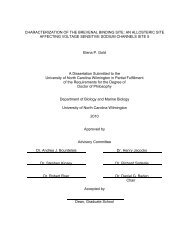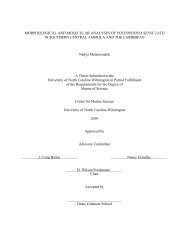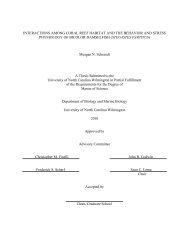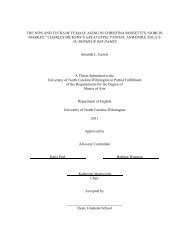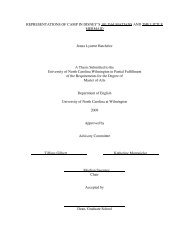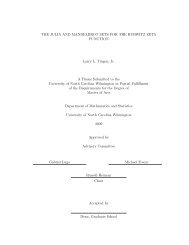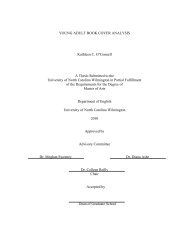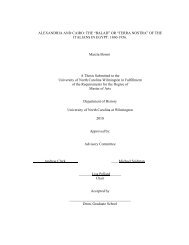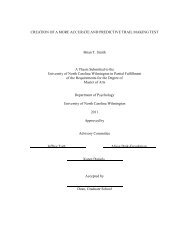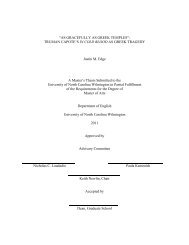AN AUGURY OF REVOLUTION: THE IRANIAN STUDENT ...
AN AUGURY OF REVOLUTION: THE IRANIAN STUDENT ...
AN AUGURY OF REVOLUTION: THE IRANIAN STUDENT ...
Create successful ePaper yourself
Turn your PDF publications into a flip-book with our unique Google optimized e-Paper software.
did not desire the establishment of a theocracy in Iran. Many Islamists, including Khomeini’s<br />
more moderate associates who had studied abroad, also had contention with the route that the<br />
revolution took. Bani-Sadr was eventually impeached in 1981, and Qotbzadeh was executed in<br />
1982 for supposedly plotting against the government. 547 Therefore, despite one of the most<br />
explosive revolutions of the twentieth century, the ideals of the majority of Iranian student<br />
protesters from the 1960s were unrealized. There is once again a burgeoning Iranian student<br />
movement in the twenty-first century.<br />
The impact of collapse of the shah’s regime on U.S. foreign policy was drastic.<br />
Following the Iranian Revolution, hostage crisis, the Iran-Contra affair, the Iran-Iraq War, and<br />
two invasions of Iraq, the United States has failed to find a reliable Muslim ally in the Middle<br />
East. In the 1960s, the intersection of Iranian student protest and American foreign policy served<br />
as an ever-present reminder that U.S. policy in the region was flawed. However, consecutive<br />
administrations in Washington made many decisions, highlighted by Nixon and Kissinger’s May<br />
1972 trip to Tehran, which further entangled the future of U.S. foreign policy in the region with<br />
the fate of the shah. While historian Jeremi Suri argues that détente was a conservative reaction<br />
to the international unrest of the 1960s, it is difficult to apply this paradigm to U.S. – Iranian<br />
relations. Instead, the tightening of U.S. – Iranian relations was a pragmatic policy decision that<br />
was the result of Realpolitik philosophy. With the threat of Iranian rapprochement with the<br />
Soviet Union, the weakening of American military capabilities after the Vietnam War, the<br />
British withdrawal from the Persian Gulf, and the alteration of Middle Eastern politics following<br />
the Six Day War, policymakers in Washington viewed the shah as the guardian of the Persian<br />
Gulf.<br />
547 Refer to Abol Hassan Bani-Sadr, My Turn to Speak: Iran, the Revolution & Secret Deals with the U.S., trans.<br />
William Ford. McLean (Virginia: Brassey’s, Inc., 1991); Jerome, The Man in the Mirror.<br />
129


